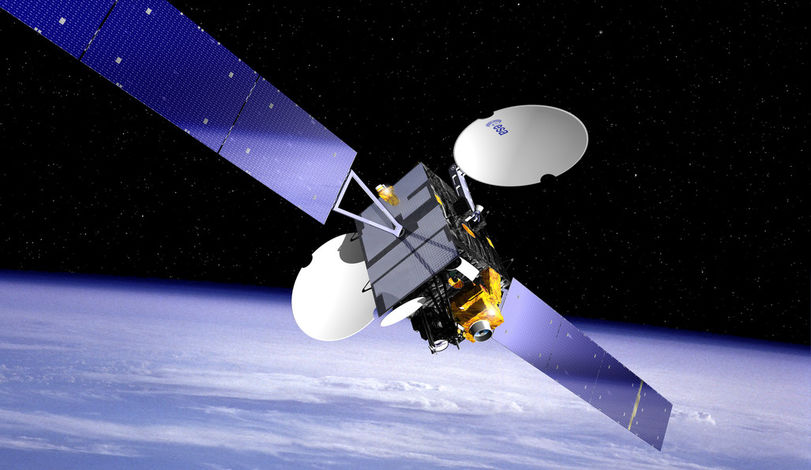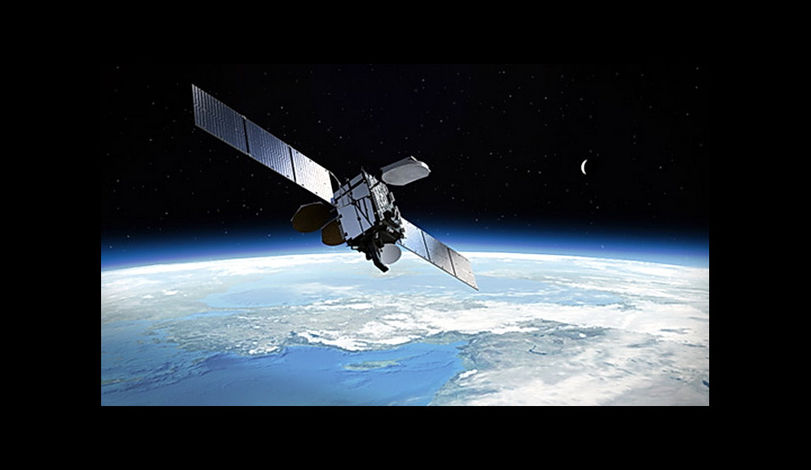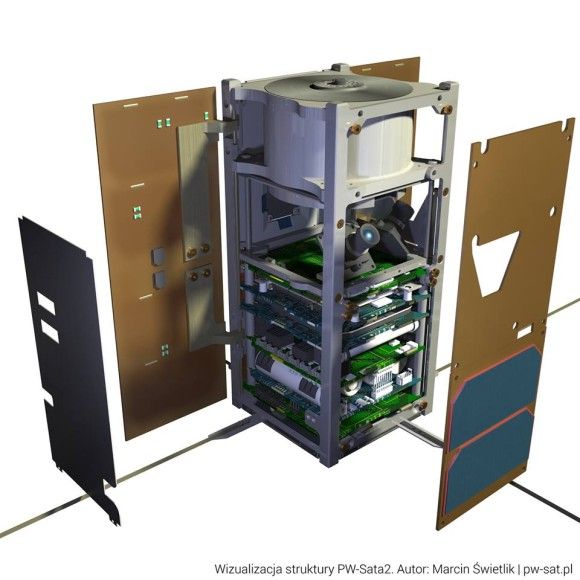- WIADOMOŚCI
- ANALIZA
Telecommunications Independence for Poland. Is a New Satellite Going To Be Built?
Polish Space Agency has began the initial stage of the conceptual works related to a Polish telecommunications satellite which, above all, would be tasked with a defence-related mission. Within the upcoming several years, we may expect that a feasibility study for this project is created. However, no plans have been made by the Polish Ministry of Defence, when it comes to the assets that would be required to acquire the equipment of this type.
Works on a Polish Telecommunications Satellite About to Begin
The Polish Space Agency has began the initial stage of the conceptual works related to a Polish telecommunications satellite. Acquisition of a satellite of this class would secure the needs of our country within the domain of obtaining independent transfer capabilities pertaining to the military satellite data. System of this type would also facilitate communications between the military units, including the units deployed abroad. The above programme is especially significant when one considers the NATO commitments made by Poland, along with the involvement of the Polish Armed Forces in foreign deployments, such as the missions in Afghanistan, Iraq, or the recent deployment to Kuwait, the aim of which is to fight against Daesh.
Communication With The Units Stationed Abroad

The recent experiences suggest that permanent access to a broadband data connection needs to be provided for the units of the Polish Military Contingent [Polski Kontyngent Wojskowy – PKW], in order to maintain communications with the command. At the same time, it shall be expected that, as high quantity and volume of data is becoming more and more accessible (including high quality photographs, video streaming, conference calls, satellite data), the demand for expanding the capabilities within that scope would also be an area of a continuous growth. Up until now, access to the telecommunications-transferred data for the Polish forces has been provided through provision of access to the US Army and NATO satellite assets, as well as through application of satellite connectivity assets provided by commercial entities. This often led to emergence of situations which could potentially turn out to be dangerous, e.g. as the one that became public back in 2011, when it turned out that confidential data for the Afghanistan detachment was being transferred through the Yamal-202 satellite, belonging to the Russian state-driven Gazprom company. Even though we do not know whether the Russian intelligence was able to intercept the sensitive information transferred through the satellite in question, such circumstance cannot be ruled out entirely.
Initial Feasibility Study – Deadline Set As 2020
In the light of the facts above, some voices in Poland suggested that potential acquisition of own telecommunications satellite should be considered. Currently, the Polish Space Agency is in the process of initiating the works on that project. Even though acquisition of such equipment should not be expected soon, and, even though, according to the current plans, the Earth Observation satellite launch is going to come first, one should note that relevant steps have been undertaken to begin the works on the programme in question.
The conceptual works pertaining to the Polish telecommunications satellite are still in their infancy though. As the Polish space programme emerged, the national needs concerning the use of the space and satellite technologies are being scrutinized. Telecommunications are one of the domains, within which our satellite-connectivity needs are growing constantly. At the moment, this area is being secured by a number of foreign entities, however negotiations are being carried out, involving the leading Polish Universities and research and development centres, the goal of which is to initiate the entry-level conceptual works on construction of our own satellite potential within this area.

According to Col. Suszynski, the agency plans to, considering the dynamics of development of the Polish space industry, make binding decisions within the period between 2019 and 2020, concerning the further fate of the development works which have been undertaken recently. The steps undertaken within that programme will be preceded with implementation of a relevant feasibility study. Above all, placing the elements of the military satellite communications and connectivity infrastructure created in Poland within the foreign orbital instruments. In the further perspective, a Polish satellite could be created. Such platform would also be designed to fulfil a number of non-military purposes.
We assume that capabilities in the area of communications will develop in an evolutionary manner. During the initial phase, modules manufactured in Poland and embedded within foreign satellites shall be created, making it possible to execute tasks in a variety of areas related to the national security. Then, we will be driven towards creation of a telecommunications satellite which would, in a complex manner, meet the needs of our country - both in the civil, as well as in the defence domain.
With Support Provided by the Polish Space Sector
Considering the fact that the Polish space industry is expected to acquire new competencies in the upcoming future, thanks to the programme, the aim of which is to create an optronic earth observation satellite and other orbital instruments, such as an astronomic UV research satellite or SAR satellite, in a long term setting, the Polish companies may achieve readiness to get deeply involved in the project mentioned above. This is also visible in the light of the fact that the “actual” works are to begin no sooner than in 2020 – in the period when the optronic satellite programme shall be fairly advanced. Contributions to the aforementioned programme made by the domestic industry are hence being taken into account within the plans made by POLSA.
Read More: Polish Optronic Satellite - Competition To Be Announced Soon
New Satellite and the Budget of the Polish Ministry of Defence
The questions regarding the interest placed within the telecommunications satellite project have also been sent by us to the Ministry of Defence which shall remain the main entity to manage the application of the new equipment. However, the POLSA’s plans have not yet been taken into account within the budget of the ministry. This is not surprising, considering the fact that the profile of those plans is still preliminary.
Polish Ministry of Defence has not yet planned and is not planning an expenditure related to acquisition of a telecommunications satellite.
Thus, it is difficult to assess whether the Polish Ministry of Defence is going to be genuinely interested in working on that project, considering the vast number of other modernization programmes that are being implemented at the moment within the Army, including the programmes which are closely tied to the outer space, treated with utmost priority, namely the Earth Observation programme, SST programme, as well as the Polish contribution to the Galileo European satellite system.
Read More: Space Plans Made By The Polish Ministry of Defence. “Defined Needs” vs. Great Challenges
What’s next?
It is worth to note the fact that acquisition, or domestic development programmes related to the telecommunications satellites, are being pursued by more and more countries. Besides the space superpowers, including the United States of America, Russia, China or France, equipment of this class is also being used by a number of nations thee economic status of which is less advanced, including Indonesia, Mexico, Pakistan, Argentina, Azerbaijan or Turkey. Ankara also has an ability to create its telecommunication satellite platforms autonomously. In the nearest future, similar systems developed by Bulgaria or by the governmental agency from Bangladesh should also be launched into the orbit. The above, incomplete list shows that such satellites often become a standard tool utilized by a number of governments, also those of countries that are poorer. The Turkish example shows that construction of a system of this class may be utilized within the scope of effective development of the domestic space industry.

Polish acquisition process related to a telecommunications satellite, in the light of the above circumstances, constitutes a logical and relevant step, towards using the potential offered by the outer space, for the purpose of improving the national security. The first element of that domain is seen in Earth Observation. Within that scope, the Polish needs shall be exhausted by an Agreement signed with the Italians, concerning the Polish involvement in the Cosmo-SkyMed initiative and data purchase pertaining to the information gathered by the Opsat 3000 satellite. In the nearest future, the domestic satellite programmes, as well as the involvement in the Galileo programme are expected to be pursued, while a gap has been seen in safe and independent access to the telecommunications systems.
Moreover, one should take into account the fact that the prospective satellite may also be utilized within a myriad of non-military applications, including provision of commercial services, which would diminish the cost of creating and operating the newly acquired equipment. The programme should also become a valid source of ambitious tasks for the Polish space industry in a long-term perspective. This would constitute a chance for further reinforcement of this area. From this point of view, interest of the Polish Space Agency exhibited in that area should be assessed positively, however, at the same time one should be aware that tangible effects of the works which are currently being initiated will not be visible for years to come.


















